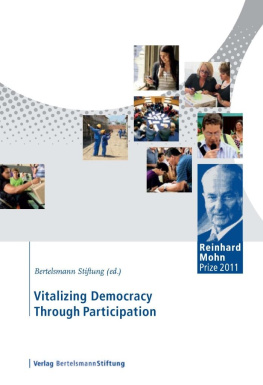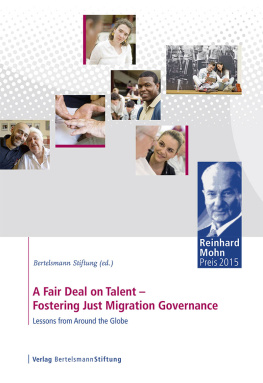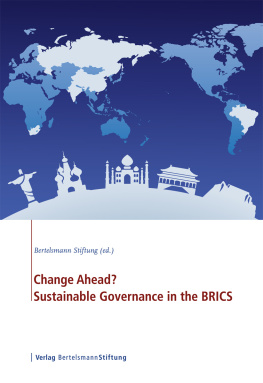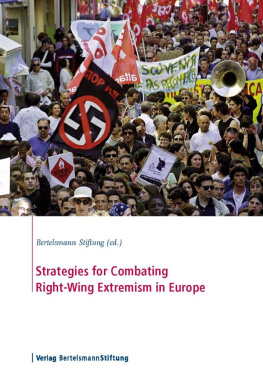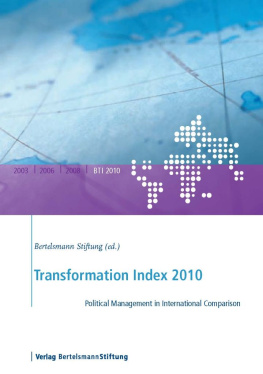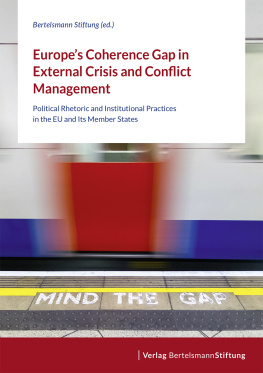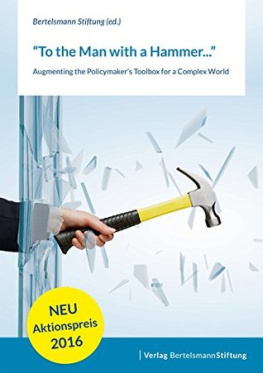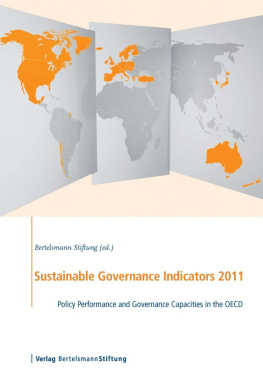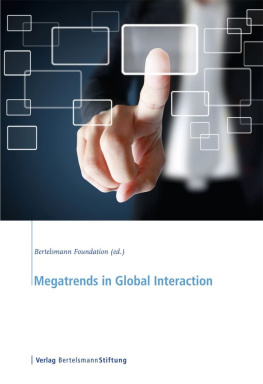Bibliographic information published by the Deutsche Nationalbibliothek
The Deutsche Nationalbibliothek lists this publication in the
Deutsche Nationalbibliografie; detailed bibliographic data
is available on the Internet at http://dnb.d-nb.de.
2011 E-Book-Ausgabe (EPUB)
2011 Verlag Bertelsmann Stiftung, Gtersloh
Responsible: Frank Frick, Daniela R, Christina Tillmann
Translation: Barbara Serfozo, Berlin
Copy editor: Josh Ward, Bonn
Production editor: Christiane Raffel
Cover design: Bertelsmann Stiftung
Fotos: TRIERGON Bielefeld, Andreas Nowak, Patrik Neuberger; Veit Mette, Bielefeld; p. 164: Stefan Kaminski;
p. 168: Steffen Kugler; p. 170: Deutscher Bundestag/Lichtblick/Achim Melde
Typesetting and Printing: Hans Kock Buch- und Offsetdruck GmbH, Bielefeld
ISBN : 978-3-86793-386-5
www.bertelsmann-stiftung.org/publications
www.bertelsmann-stiftung.de/verlag
Table of Contents
Preface
Democracy is not just a system; it must be lived. It relies on the democratic participation of people taking responsibility for shaping their own communities.
Reinhard Mohn
In recent decades, representative democracy in Germany has proved a stable and successful model of governance. At the same time, every society is subject to constant change, and the circumstances in which we live and work undergo continuous transformation. These dynamics have an effect on our democracy and political decision-making processes. Indeed, the political and social environment of the early years of the Federal Republic of Germany can hardly be compared with todays circumstances.
One of the major changes observed across the globe in recent years has been a significant growth in the amount of influence citizens wield. In an era of daily opinion polls, their views and attitudes are gaining currency. Populations as a whole, as well as the individuals who make them up, have become more important in contemporary politics, and the interests of specific groups no longer necessarily dominate. We are encouraged by the fact that an ever greater number of citizens are trying to get involved in decision-making and consensus-building processes. This development reflects an increasingly confident population, and it clearly signals peoples desire to play a more active role in our democracy. This is a fundamentally positive development that demands an open and constructive response. Indeed, greater civic engagement, participation and involvement are consistent with a representative democracy. All elements within a society must work together and complement each other in order to expand and strengthen their shared democracy. Engaged citizens can be extremely helpful to the government and public administration bodies in securing a broader and more sustainable foundation for political decision-making.
As traditional forms of participation lose ground, citizens are searching for new ways to get involved. Since many feel that parties and politicians no longer represent their needs, there is a widespread sense of discontent with political parties. However, there is little evidence to back up the frequent claims that disenchantment with politicsor even with democracy itselfis on the rise. On the contrary, people are simply looking for new forms of participation. In fact, in Germany alone, there have been more than 6,000 petitions calling for a referendum in its municipalities and federal states since 1990. Many of these initiatives and the activities accompanying them are born not of a reaction against something but, rather, of a reaction for something, and they are characterized by positive and practical goals. Indeed, people get involved when they believe their actions can have an effect on their immediate environment. They approach issues and problems constructively and with a level head, frequently suggesting creative and unconventional solutions and strategies.
Our founder, Reinhard Mohn, was profoundly influenced and impressed by the matter-offact way in which people in the United States shape and contribute to their communities. During his time as a prisoner of war there, and on many return trips, he observed several examples of this kind of civic engagementand he always kept an eye out for ways to plant similar seeds in Germany. For Mohn, citizens represented not only the thing that makes up a society, but also its driving and binding force. For these reasons, I am very pleased that the first-ever Reinhard Mohn Prize is devoted to civic participation.
The prize was established to commemorate Reinhard Mohn as a citizen, entrepreneur and founder and to nurture his ideas, attitudes and vision. It is within the spirit of these goals that we have sought out effective strategies across the world in order to learn from the ideas and approaches of its inhabitants.
For this premier edition of the Reinhard Mohn Prize (2011), Vitalizing Democracy Through Participation, the Bertelsmann Stiftung searched the globe for government-affiliated programs or institutions that have successfully involved citizens in political decision-making. Through their example, the finalists testify to two things: first, that participation increases the acceptance of policy decisions and the quality of political decision-making; and, second, that it also engenders a greater sense of responsibility and identification among citizens. Whats more, these developments in turn help to significantly reduce the gap between citizens and government.
The first Reinhard Mohn Prize has been awarded to the city of Recife in Brazil for its outstanding efforts in vitalizing democracy. At the heart of the Recife project is a participatory budgeting process granting citizens comprehensive decision-making powers. Every year, more than 100,000 individuals, young and adult, are actively engaged in decisions affecting the future of their schools and city. Now ten years old, the project involves citizens in shaping the Brazilian citys development through meetings and by using the Internet. Citizens, who bring suggestions and help set priorities, have initiated nearly 5,000 measures and influenced the direction of some 220 million public expenditure over the past ten years. Compared to many of the participatory budgeting processes in Germany, the Recife model stands out for the ways in which it facilitates civic engagement. By involving citizens of a major city in its budgetary decision-making process, the Recife project powerfully demonstrates how civic leaders can effectively diminish the gap between government and citizens through broad cooperation and participatory measures.
The Reinhard Mohn Prize will be used to identify innovative solutions to contemporary challenges facing societies around the world. The finalists of this years competition demonstrate the value of looking beyond our own backyard. Representative democracy can be vitalized, citizen participation in the political process can be strengthenedand Germany can learn from these examples!
Gunter Thielen
Chairman and Chief Executive Officer of the Bertelsmann Stiftung
The Reinhard Mohn Prize 2011 Process
Sarah Brabender, Alexander Koop, Daniela R, Christina Tillmann
The Reinhard Mohn Prize 2011 is awarded to a government institution whose projects serve to stimulate democracy, incorporate underrepresented groups and involve citizens in political decision-making through innovative activities and techniques. Vitalizing democracy through participation is our guiding principle and one we wanted to remain faithful to in our search for and selection of the Reinhard Mohn Prize 2011 winner. In a deliberate departure from traditional processes (e.g., having expert panels make decisions behind closed doors), we actively involved citizens in scouting out potential prize winners. Indeed, all phases of the process were transparent and took place with full public participationfrom the submission of proposals to the discussion, comment-gathering and evaluation phase for nominated projects, to the decision on the final winner.


